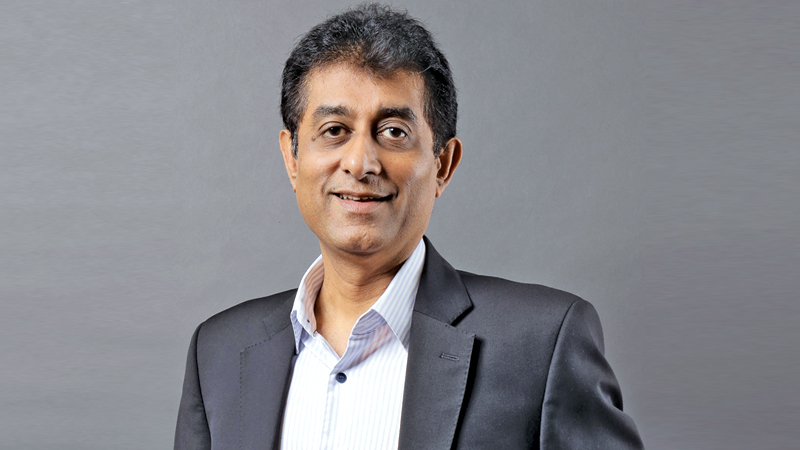 In a candid interview with the Sunday Observer, Ceylon Chamber of Commerce (CCC) Chairman Duminda Hulangamuwa highlighted the critical need for continued economic reforms and political stability to ensure sustained growth in Sri Lanka. Reflecting on the country’s recent journey from economic turmoil to a measure of stability, Hulangamuwa emphasized the importance of collective efforts and the Government’s and citizens’ role in driving the recovery. He also emphasized that political stability is the key to economic recovery.
In a candid interview with the Sunday Observer, Ceylon Chamber of Commerce (CCC) Chairman Duminda Hulangamuwa highlighted the critical need for continued economic reforms and political stability to ensure sustained growth in Sri Lanka. Reflecting on the country’s recent journey from economic turmoil to a measure of stability, Hulangamuwa emphasized the importance of collective efforts and the Government’s and citizens’ role in driving the recovery. He also emphasized that political stability is the key to economic recovery.
Q: Are you happy that in contrast to 2022, some measure of economic stability has been achieved by now?
A: Yes, absolutely. During the crisis, as Vice Chairman of the Chamber, we engaged extensively with all political parties, unions, civil society, business groups, and foreign missions. We witnessed firs-thand the sufferings and challenges faced by the country.
There was a time when we were uncertain about what to do the following day, both in terms of running our businesses and addressing the political crisis. I am very satisfied with the achievements so far. This is not to support any particular individual or Government but to acknowledge the collective efforts of the President, Governors, and Central Bank officials. Their collective effort has contributed to the calmness and stability we have achieved now, which is a prerequisite for growth.
Of course, there is still a long way to go. Some people think everything is over, but it’s not so. We must continue the reform process, however, painful it might be. Increasing taxes is very difficult and costly for both the private sector and employees, but it is necessary. If we are in debt and unable to pay it, we must find money from somewhere to pay it. Creditors who have lent us money are not going to write it off. Unless we take corrective measures to work out the situation and start repaying the debt, we won’t be able to move forward. That’s the simple solution. So, we are working towards that, and I can see the Government working towards that too. We all need to ensure it happens, not for the benefit of the President or the Government, but for the people, at large.
It’s important to note that this is not just one man’s mission to accomplish. Everyone should contribute towards it. People might say that the Government is responsible for the crisis, and while I agree to some extent, the people also have a role to play. When Governments come and promise things they can’t deliver, people must understand the consequences. Many people have benefited from the poor decisions in the past, such as low dollar rates and low taxes, whether it was the dollar at Rs. 180 or taxes at 18 percent, we all reached a level where everyone bought vehicles and consumed as much as they could. As a result, we ran out of reserves. So, as a nation, we now have to start repaying and rebuild our country to what it was.
Q: Is going to the IMF, the only recourse available? Can its terms and conditions be amended later?
A: Given the circumstances, no one likes going to the IMF. The conditions are immediately imposed, and it’s uncomfortable to have an external party dictate terms to us. However, in a situation where we have defaulted on debt and need sufficient income to meet our expenses, pay public servants salaries, carry out welfare programs, and pay pensions, we had no choice. If we don’t have money, no one will lend us any. The IMF stepped forward and said they would help, but with certain conditions.
India gave us 4.5 million dollars during the hydro crisis, which we used quickly. We can’t keep looking for temporary solutions like that. That’s why an organisation such as the IMF, which has the credibility to reassure creditors, is necessary. Although we may not like the terms and conditions, we have no choice in this situation.
Regarding the possibility of amending the terms and conditions, technically, Governments can attempt to negotiate. However, if we unilaterally change the terms, the IMF will likely walk out. They have credibility and acceptance among creditors, which is crucial for our financial stability. So, while Governments can lobby for more favourable terms, it’s unlikely that the IMF will agree to significant changes even if they come with a fresh mandate.
Q: Some Ministers and experts say that the country will not survive even for two weeks if the IMF deal is scrapped by a future Government. Is there any truth in this?
A: Definitely. If the IMF withdraws, creditors will demand their money, leading to a default. This would cause our ratings to plummet, and we would be unable to import essential goods. Our reserves are currently around 3-4 billion dollars, which is insufficient to sustain us without external support. Political stability has brought remittances, tourism, and stable exports. If the IMF leaves, these positive trends will reverse, causing another foreign exchange crisis and political instability. This scenario is not even an option to consider.
Q: Has confidence increased among investors and trading partners after the debt restructuring deal with the Paris Club and China?
A: It’s too early to see the immediate effects, but it will definitely have a positive impact in the future. We are awaiting the exact details of the debt restructuring, which must be agreed upon by the IMF. Once that happens, our ratings will improve, signalling to investors that the country could repay its debts. This will gradually build investor confidence, although it won’t happen overnight. The process of rebuilding confidence takes time, but the initial steps are promising. It will definitely be for the best, not for the worst.
Q: Do you think the present administration should continue until full economic stability is ensured?
A: This is a difficult question to answer as it is highly political. We need an administration that follows consistent policies and has a clear vision. Stability and a decisive path are crucial for economic recovery. Whether this administration or another, what matters is the commitment to the same policy framework and vision.
Q: What are your suggestions to achieve economic prosperity?
A: Economic prosperity is a gradual process. We need to focus on debt restructuring and large-scale projects such as the BIA and Expressways, which can bring billions into the market. And on another level, those projects can provide employment to all sectors of society. This will benefit all sectors and create jobs. To achieve a 7-8 percent growth rate, we need substantial foreign investments, political stability, rule of law, and anti-corruption measures. The domestic economy can’t itself invest and grow. We need foreign investments in this country. The proportions that came in during J.R Jayewardene’s times came due to political stability. A clear vision and a proper leader is a must to attract foreign investment. The perception of the country must be improved internationally.
Sectors such as tourism, shipping, logistics, IT, and Business Process Outsourcing (BPO) can drive growth. We need to invest in tourism to attract high-spending visitors and improve our logistics infrastructure. Our location and expertise in shipping can be leveraged to increase investment in this area. The IT and BPO industry can use our highly educated workforce, especially accountants to attract investment.
Agriculture is crucial to feed our people, but we need to focus on industries where we have a competitive advantage. Export of goods requires efficient import-export operations and competitive pricing. We must also explore Free Trade Agreements with countries such as Thailand and Vietnam to access new markets. Western markets are getting increasingly competitive and not growing, so only growth is in the Eastern markets we need to have FTAs with countries such as Vietnam and Indonesia.
Q: There are allegations that many exporters park their money abroad, which can resolve the economic crisis at home. What is the truth about this?
A: I don’t think this is correct. During the crisis, exporters brought money back to import essential goods like petrol, food, and medicine. They have been responsible and supportive. While there may be a few exceptions, the majority have contributed positively. Exporters were crucial in providing the funds needed to keep the country running during the most challenging times.
Q: What steps can be taken to develop entrepreneurship?
A: Entrepreneurship requires support from the Government in terms of financing, concessional land, and market connections. Entrepreneurs can test their products locally before expanding internationally. Governments should facilitate backward integration, linking smaller entrepreneurs with larger companies. The Chamber plays a role in connecting SMEs with bigger players and exploring digitalisation to link farmers with producers.
Q: What are some of your major concerns regarding the economy?
A: My major concern is political risk and the need for public sector reforms. We need significant changes in the public sector to improve efficiency and productivity. This requires strong political decisions and consensus among all political parties. The Opposition must also support good decisions for the country’s benefit. Public sector reforms are essential for better service delivery and cost reduction. We need to modernise and digitalise our public services to reduce inefficiencies. For example, we need to consider how efficient and needful the Postal Department is in the current society. Are we using the same railway tracks and trains we used 75 years ago? We need new technology as well as new dimensions to elevate the country to economic prosperity.
Q: Do you believe that elections should be put on hold until the economy recovers further?
A: No, I don’t think so. Democracy and franchise must be respected regardless of economic outcomes. They are not interconnected in my view. The economic situation should not dictate the electoral process. People must have the right to choose their leaders, irrespective of economic conditions.
Q: What are your final thoughts on the economic situation and the way forward?
A: We are on a path to recovery, but it requires collective effort and painful decisions. We need to focus on long-term solutions rather than short-term fixes. It’s crucial to continue with reforms, attract foreign investments, and ensure political stability. The Chamber will continue to support these efforts and work towards a prosperous future for the country.




